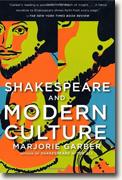Shakespeare and Modern Culture
Marjorie B. Garber
book reviews:
· general fiction
· chick lit/romance
· sci-fi/fantasy
· graphic novels
· nonfiction
· audio books
· author interviews
· children's books @
curledupkids.com
· DVD reviews @
curledupdvd.com
newsletter
win books
buy online
links
home
for authors
& publishers
for reviewers

 |
Shakespeare and Modern Culture Marjorie B. Garber Anchor Paperback 368 pages December 2009 |
|
Click here to read reviewer Barbara Bamberger Scott's take on Shakespeare and Modern Culture. This book looks at how Shakespeare has been reinterpreted over the ages and how our own era looks at some of his best-known plays. It’s not an easy read and presupposes considerable knowledge of the bard and his output. In places, this reviewer found Garber’s insights to be enthralling. Occasionally, they fall prey to the academic’s temptation to become over-academic and self-consciously intellectual. In total, however, the book is well worth the reader’s effort.
Garber boils the theme of each chapter and each individual play to one word – thus “Romeo and Juliet”’s key word is ‘youth,’ “Othello”’s is “difference,” and the word that sums up “Henry V” is “exemplarity” – a word this reviewer wishes she hadn’t used since it means nothing to him. But the discussion of this play is illuminating, especially the differences in the two movie versions, one by Lawrence Olivier filmed during the height of World War II when Britain stood in imminent danger of invasion, and the second by Kenneth Branagh, made in the aftermath of the Falklands War. As the book progresses, we get less discussion of Shakespeare in popular culture and more of his impact on what could be termed “high culture.” There is extensive analysis of plays by Brecht and Beckett, which this reviewer was not familiar with. We also get large doses of Marx and Freud and a detailed discussion in the chapter on “Hamlet” of Tom Stoppard’s brilliant riff, “Rosencrantz and Guildenstern Are Dead.” One curious omission: Garber, a professor at Harvard, does not mention the work of Harold Bloom, whose Shakespeare: The Invention of the Human covers some of the same ground, albeit from a different perspective. One wonders why. How strange the workings of the human mind. Originally published on Curled Up With A Good Book at www.curledup.com. © Alan Elsner, 2010 |
|
|
|
 Click here to learn more about this month's sponsor! |
|
| fiction · sf/f · comic books · nonfiction · audio newsletter · free book contest · buy books online review index · links · · authors & publishers reviewers |
|
| site by ELBO Computing Resources, Inc. | |
 Shakespeare, Garber argues, has seeped into our modern culture in all sorts of interesting and unexpected ways. “Romeo and Juliet,” for example, has become a template for young love and by extension youthful rebellion and “youth culture.” “The Merchant of Venice” is a prism for contemplating anti-Semitism, while “Othello” and “The Tempest” both raise issues of racism. “Henry V” is used as a management manual to teach executives leadership skills and decision-making. “Richard III” is an exercise in propaganda.
Shakespeare, Garber argues, has seeped into our modern culture in all sorts of interesting and unexpected ways. “Romeo and Juliet,” for example, has become a template for young love and by extension youthful rebellion and “youth culture.” “The Merchant of Venice” is a prism for contemplating anti-Semitism, while “Othello” and “The Tempest” both raise issues of racism. “Henry V” is used as a management manual to teach executives leadership skills and decision-making. “Richard III” is an exercise in propaganda.